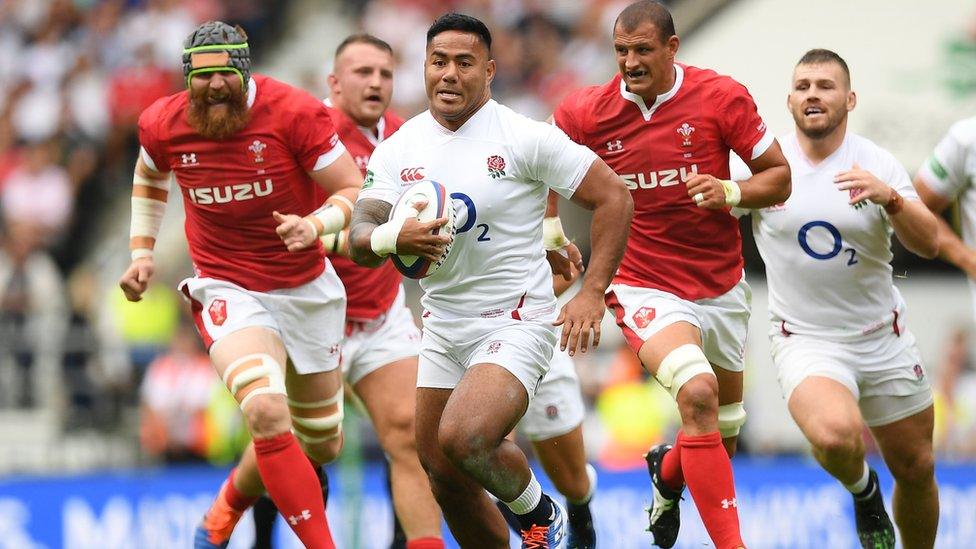Rugby World Cup Japan 2019: Everything you need to know
- Published
- comments

On Friday, the Rugby World Cup begins in Japan. It is the biggest tournament in the sport of rugby union.
The first Rugby World Cup was held in 1987.
Until that point, the USA were considered world champions in the sport having won the Olympic games in 1924.
Like in football, the Rugby World Cup happens every four years. The competition is one of the biggest sporting events in the world - along with the Football World Cup and the Olympics.
The tournament will start on 20 September and lasts until 2 November.
How does the Rugby World Cup work?
There are only 20 places available in a Rugby World Cup, so teams must compete for those spaces in a qualifying competition. Teams that reached the knockout stages of the previous tournament automatically qualify for the next tournament.
The 20 teams competing this year are: Ireland, Scotland, Wales, England, Russia, Japan, Samoa, New Zealand, South Africa, Namibia, Italy, France, USA, Tonga, Argentina, Australia, Fiji, Uruguay, Georgia and Canada.
There are four groups of five countries, with teams playing each of their group opponents once. The top two in each group go into the quarter-finals with winners progressing to the semi-final and then the final.
There is also a third and fourth play-off for the bronze medal for the losing semi-finalist.
The current champions are New Zealand who have made it to the semi-finals in each World Cup bar one, in 2007.
A Welsh referee called Gil Evans used this whistle in 1905 and it has been used in tournaments ever since
Same whistle
The same whistle is blown for the opening game of every Rugby World Cup tournament.
It was first used in 1905 by a Welsh referee during a game between England and New Zealand, which New Zealand won 15-0.
The referee of the match was Welshman Gil Evans. After the game, Gil gave the match whistle to another referee, Albert Freethy.
Almost 20 years later, Albert was still using the whistle! He used it during the 1924 Olympic rugby final.
In 1969, the whistle was donated to the New Zealand Rugby Museum. It was used to start the first match of the 1987 Rugby World Cup and that started the tradition.
The William Webb Ellis Cup is named after the man who is said to have invented the game
What is the Rugby World Cup trophy?
The World Cup winners are awarded the William Webb Ellis Cup.
William Webb Ellis was, according to popular myth, the man who invented the game.
In 1823 - so the legend goes - William Webb-Ellis, a pupil at Rugby School, picked up the ball during a game of football and ran with it.
It was at that moment that the game of Rugby Football was born.
Australia battered Namibia in the 2003 World Cup
Biggest score line
At the World Cup in 2003, hosts Australia beat Namibia 142-0.
New Zealand are the only team to score more points in a match, defeating Japan 145-17 in 1995.
Jonny Wilkinson is the top scorer in the Rugby World Cup
Top scorer
England's 2003 World Cup hero Jonny Wilkinson remains the top points-scorer in Rugby World Cup history.
He's registered 277 points, from one try, 28 conversions, 58 penalties and 14 drop-goals.
His most important drop-goal came in the dying moments of the World Cup final against Australia, winning the tournament for England.
When is the Women's Rugby World Cup?
New Zealand defeated England in the final to win the 2017 Women's Rugby World Cup
The Women's Rugby World Cup is also held every four years.
The next tournament is scheduled for 2021 in New Zealand, as they are the current champions.
It will be the first Women's Rugby World Cup to be held in the southern hemisphere, but that's not the only difference.
It was announced last month that the tournament will simply be called 'the Rugby World Cup 2021'.
World Rugby, which is in charge of the sport, wants to remove any references to gender in the tournament names as the "ultimate statement in equality".
- Published10 May 2017
- Published13 September 2015
